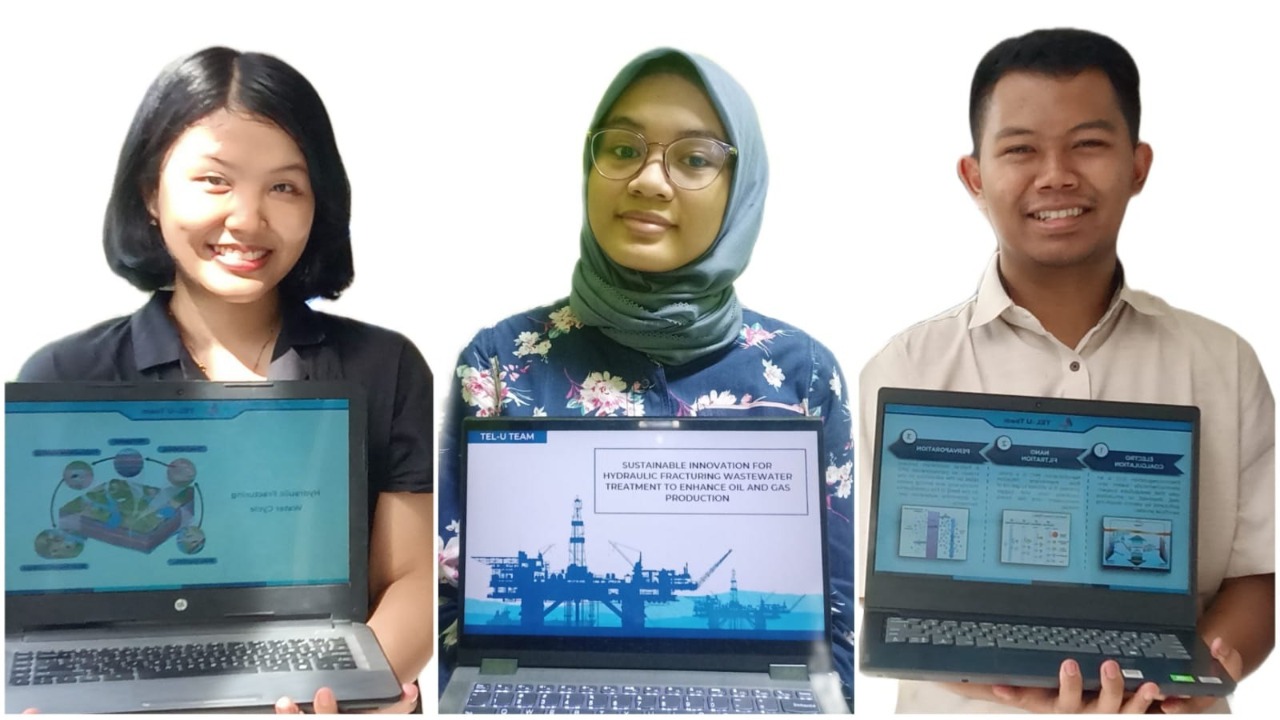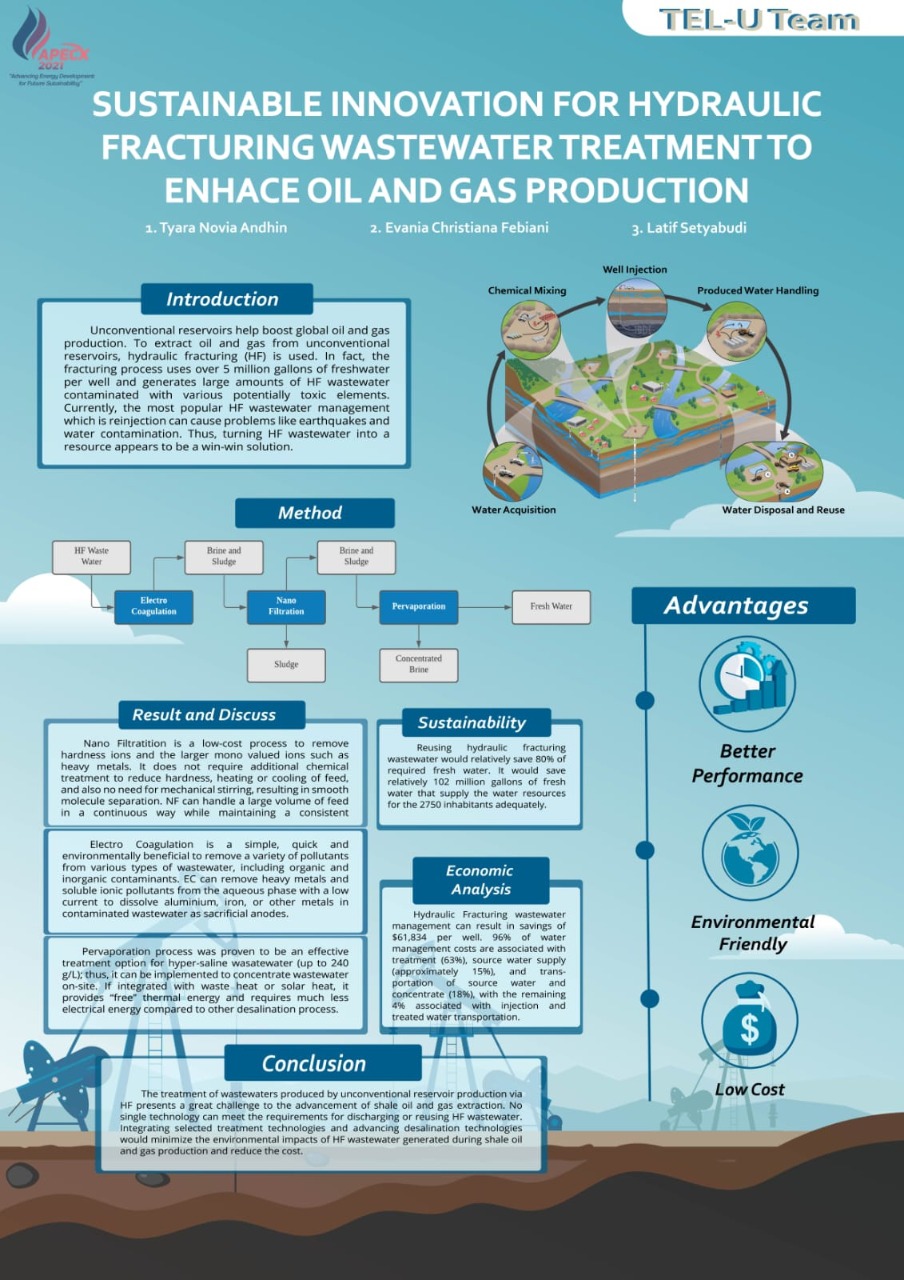Oil Extraction Wastewater Recycling System by ITS Students

(From left) Evania Christiana Febiani, Tyara Novia Andhin, and Latif Setyabudi from ITS succeeded in initiating a petroleum extraction waste recycling system
Campus ITS, ITS News – The process of extracting petroleum that is still trapped in rock layers produces large amounts of water waste. Aware of the dangers of waste to the environment, three students of the Institut Teknologi Sepuluh Nopember (ITS) who are members of the TEL-U Team innovate an oil extraction wastewater recycling system so that it can be reused, as well as an effort to save water.
One method of extracting petroleum contained in rock layers is the hydraulic fracturing technique. This technique itself is applied to crack the rock walls in the wells that have been dug, then the oil in the rocks is channeled back to the surface. “This process requires fluid injection to create and extend the rock fragments,” explains Tyara Novia Andhin, Team Leader.
Tyara explained the injection fluid consists of 95 percent water, 4 percent propane in the form of sand, and 1 percent mixture of other chemicals. “At least 5 million barrels of water are needed, which is equivalent to 19,700 Olympic swimming pools,” said the ITS Chemical Engineering Department student.

The stages of the oil extraction wastewater treatment process, the ITS student team innovation
Furthermore, Tyara explained that the water will be injected into rock wells and then will rise back up by itself to the surface along with oil. After the separation of water and oil, the wastewater mixed with dirt and groundwater will be disposed of. But only with the necessary treatment without any special treatment. “In addition to wasting water, waste can be harmful to the surrounding environment,” he said.
Departing from this problem, Tyara together with two members of his team who also came from the ITS Chemical Engineering Department, namely Evania Christiana Febiani and Latif Setyabudi innovated their wastewater recycling system. The system proposed by the ITS team combines three methods at once, namely electrocoagulation, nanofiltration, and pervaporation. “Through this method, water can be used up to three times in the oil extraction process,” said Tyara.
In more detail, Tyara explained that wastewater will go through an electrocoagulation process first to precipitate chemical solids, heavy metal ions, and other organic compounds contained in wastewater. “These deposits and clumps will be separated from the water by a nano-sized membrane in the nanofiltration process,” added the student from Surabaya.

The display of the ITS student team poster explaining the innovation of the petroleum extraction wastewater treatment system
In the last stage, the water will be processed by the pervaporation method which utilizes a hydrophilic membrane. This membrane is very effective in removing very high salt content in water due to sewage mixed with groundwater. The hydrophilic membrane will only attract water content, so salt and remaining particles can be separated from the water with an effectiveness of up to 99 percent. “Pervaporation can handle water with a salt content of up to 250mg/L,” he said.
Lifting a paper entitled Sustainable Innovation for Hydraulic Fracturing Wastewater Treatment to Enhance Oil and Gas Production, this ITS representative team has also won the title of the first runner-up and favorite poster in the APECX 2021 competition held by Universitas Gadjah Mada (UGM), last year. “This innovation can reduce the cost of water distribution and is environmentally friendly because it reduces emission production during water distribution,” he assured. (ITS Public Relation)
Reporter: Frecia Elrivia Mardianto
Related News
-
ITS Supports Academic Infrastructure: New Medical Faculty Building
ITS Campus, ITS News — Entering the second year of accepting new students from the Faculty of Medicine and
February 24, 2022 18:02 -
ITS Welcomes 163 New Engineers to Empower Indonesia’s Growth
ITS Campus, ITS News – Institut Teknologi Sepuluh Nopember (ITS) continues its commitment to meeting the needs of engineers in
February 24, 2022 18:02 -
ITS Sends Off 12 Free Mudik Vehicles Ahead of Eid Al-Fitr
The dispatch of 11 bus fleets carrying ITS students for the Free Mudik ITS 2024 ITS Campus, ITS News
February 24, 2022 18:02 -
ITS Lecturer Wins 2024 Female Science Talents Intensive Tracks from Germany
Sri Fatmawati SSi MSc PhD, a lecturer at the Department of Chemistry, ITS, has emerged as the winner of
February 24, 2022 18:02
